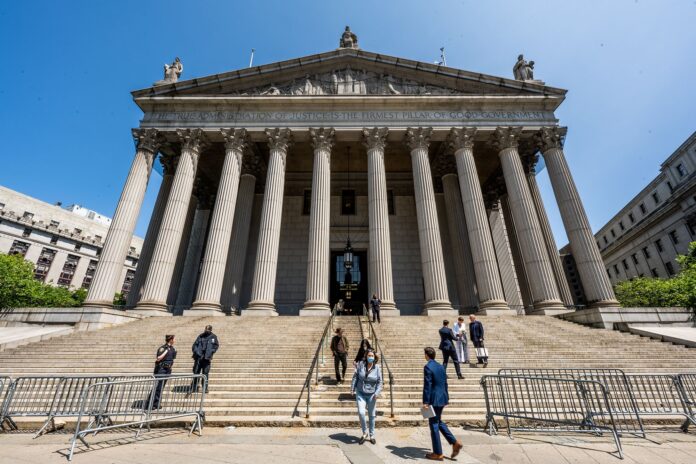
(CNN) — Jury selection is set to begin Monday to impanel a group of 12 New Yorkers who will ultimately decide whether to convict former President Donald Trump in his first criminal trial.
Court officials expect about 500 new jurors to appear each day beginning April 15 to be available for the selection process, though some of those individuals will also be pulled to other cases in the court system.
As in any state criminal court case in the county, the pool will be limited to people who live in Manhattan.
About 100 prospective jurors at a time will be brought into Judge Juan Merchan’s courtroom to be vetted.
Twelve jurors will make up the panel that will ultimately consider the 34 counts of falsifying business records against Trump. Six alternates will also hear the case in case a juror on the main panel needs to be replaced.
Prospective jurors can be dismissed by the judge for cause if he finds they shouldn’t serve on the panel. Prosecutors and Trump’s defense team will also get 10 peremptory strikes they can use to remove a juror from the pool, no questions asked.
Questioning the jury pool
Potential jurors tapped to enter the prospective pool for Trump’s panel will complete a questionnaire created by the judge with input from the attorneys for Trump and the Manhattan District Attorney’s Office.
They will be asked a wide range of questions, including where in the city they live, where they get their news, whether they’ve ever attended a rally for the former president and whether they have had any affiliation with groups like the Proud Boys or the QAnon movement.
Potential jurors will be quizzed on their feelings about Trump, but they won’t be asked explicitly which political party they belong to or which candidates they’ve voted for or have made campaign contributions to. Trump’s lawyers wanted to ask those questions, but the judge excluded them from the final questionnaire.
The prospective jurors will be asked if they or anyone in their circle have ever been to Trump rally, worked or volunteered for a Trump presidential campaign, the Trump presidential administration, or any other political entity affiliated with Trump. They’ll also be asked if they’ve ever participated in any anti-Trump groups or events.
In addition to their news consumption, jurors will be asked whether they’ve ever read or listened to any books or podcasts by Michael Cohen or former Manhattan prosecutor Mark Pomerantz, who also wrote a book about this case.
Trump’s social media platform, Truth Social, is also listed among the platforms potential panel members will be asked about.
If they make it into the jury box in Merchan’s courtroom, they’ll read their answers out loud. The attorneys and the judge can then ask them follow-up questions to further vet them for possible conflicts or biases.
Merchan has said he will dismiss any prospective jurors who self-report that they believe they are unable to serve on the panel. Merchan ruled he will dismiss those prospective jurors without individually questioning them about their reasoning despite a request from Trump’s attorneys to do so.
When Merchan presided over the Trump Organization’s criminal tax fraud trial in 2022, he individually questioned prospective jurors about their reasoning.
In a pretrial letter last week, the judge said that process was “time consuming and unproductive” and not logistically feasible in a packed courtroom filled with several attorneys for each side plus the Secret Service agents providing added security for Trump.
We’ve heard this before
Hundreds of New York jurors have been asked similar questions about their feelings about Trump and their news-reading habits at other trials such as the Trump Organization tax fraud trial and Trump’s civil trials with writer E. Jean Carroll.
Jurors in both trials with Carroll in New York federal court were asked whether they associated with any fringe groups.
A couple of jurors in Trump’s most recent trial with Carroll said they believed the 2020 election was stolen. Merchan said he will not ask jurors their thoughts on the 2020 election outcome during the voir dire process in this case.
The jury will remain anonymous
Identifying information about the jurors will not be publicly released to protect jurors’ privacy and avoid “exposing them to an atmosphere of intimidation.”
Merchan warned Trump in a gag order that he can’t make public comments or direct anyone else to make public comments about jurors involved in the proceedings.
A sketch artist will be allowed in the courtroom during the selection process, but they have been instructed not to sketch jurors’ faces.
The media cannot photograph or record the proceedings, and only a few reporters will be permitted into the courtroom at one time to see prospective jurors questioned in the jury box.
Most reporters will cover jury selection from an overflow courtroom with a view of Trump and the lawyers on closed-circuit monitors.
The-CNN-Wire



